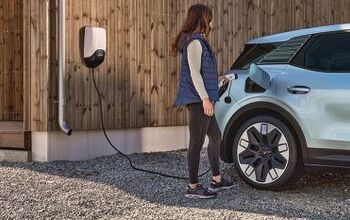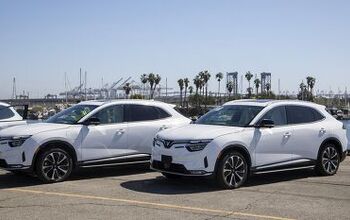Report: Automotive Industry Borrows $132 Billion Through Pandemic

The automotive industry has borrowed an estimated $132 billion since the world started taking the coronavirus more seriously, according to a recent analysis by Bloomberg.
Despite migrating around the planet months before anyone thought to close down a single airport or suggest masks were necessary, March is broadly viewed as the start of the pandemic in the Western World, as that’s when most governments started taking direct action and businesses started looking for handouts. Still, it’s exceptionally difficult to follow the money if you didn’t devote yourself entirely to the task of tracking payments while under shelter-in-place orders.
We do know that a lot of money was being thrown around, however. Car dealerships were among the largest recipients of Paycheck Protection Program (PPP) funds in the United States, garnering anywhere from $7.5 billion to $12 billion in government aid to maintain staff. Plenty of criticism over exactly where that money went arose as the press questioned which businesses were more deserving and who was just taking advantage of the system.
But it’s only the tip of the iceberg. PPP funds don’t need to repaid unless they weren’t earmarked entirely for payroll purposes; the government also used the program to send over $600 billion to support banks in extending low-interest loans to companies during the pandemic. The automotive industry was one of the largest beneficiaries of that arrangement.
According to the study, the total amount consists of $79 billion in new loans and another $53 billion in drawdowns from existing credit lines. Facilities linked to the pandemic were said to account for almost 80 percent of overall loan borrowings by the auto sector in the year to date.
From Bloomberg:
Loans for virus relief, which peaked during the March-to-June period, eased this month to less than $100 million as some companies began paying down their loans.
Ford Motor is the latest company to repay part of revolving facility drawn previously, according to an Bloomberg News report earlier this week.
The automaker said Thursday its second-quarter operating loss was less than half the $5 billion deficit it had predicted, due mainly to strong demand for its SUVs and trucks.
French parts supplier Faurecia sold a bond this week to repay its 800 million euro ($949 million) club loan from April.
Fiat Chrysler Automobiles also paid down drawdown portions of its 3.5 billion euro revolver with a bond early this month.
However, plenty of companies, usually smaller parts suppliers with less cash reserves, have asked for clemency on loan agreements as the pandemic continues ripping them to shreds. Bloomberg cited Samvardhana Motherson Automotive Systems and turbocharger supplier Garrett Motion as examples — both of which have a large pool of employees but smaller cash reserves to endure a financial crisis.
That’s important to remember in this. While the $132 billion sum sounds insane on the surface, it’s spread out across a vast industry that employs large portions of several countries. That makes it seem substantially less troublesome overall, albeit still a huge amount of money. It would still be nice to know exactly how favorable some of the terms were, since governments around the globe took direct action to help banks make more loans possible. Deciding exactly how much was necessary and who was actually in need will be a tall order, though — especially since that has to be done after the fact.
[Image: Minerva Studio/Shutterstock]

A staunch consumer advocate tracking industry trends and regulation. Before joining TTAC, Matt spent a decade working for marketing and research firms based in NYC. Clients included several of the world’s largest automakers, global tire brands, and aftermarket part suppliers. Dissatisfied with the corporate world and resentful of having to wear suits everyday, he pivoted to writing about cars. Since then, that man has become an ardent supporter of the right-to-repair movement, been interviewed on the auto industry by national radio broadcasts, driven more rental cars than anyone ever should, participated in amateur rallying events, and received the requisite minimum training as sanctioned by the SCCA. Handy with a wrench, Matt grew up surrounded by Detroit auto workers and managed to get a pizza delivery job before he was legally eligible. He later found himself driving box trucks through Manhattan, guaranteeing future sympathy for actual truckers. He continues to conduct research pertaining to the automotive sector as an independent contractor and has since moved back to his native Michigan, closer to where the cars are born. A contrarian, Matt claims to prefer understeer — stating that front and all-wheel drive vehicles cater best to his driving style.
More by Matt Posky
Latest Car Reviews
Read moreLatest Product Reviews
Read moreRecent Comments
- MaintenanceCosts Golf with a good body and a dying engine. Somewhere out there there is a dubber who desperately wants to swap a junkyard VR6 into this and STANCE BRO it.
- John Doe Orange260z - we need names not claims..if this really happened to you i feel sorry, the truckers had as you claim a democratic right to be there. the reason the horns are so loud was because NOBODY WAS LISTENING – NOT the government, NOT the media, NOT even most canadians... creeping communism, disguised as democratic socialism, sleepy sheeple who have the wool pulled over their complacent eyes. many of those believers are now experiencing life-changing health issues, blood clots, heart attacks, turbocancer, long covid, died suddenly from vax injury. and they're ton stupid to understand they did it to themselves by believing the criminals in power. big pharma, industrial military complex, global banking, this goes way past some truck horn trying to wake you up to what's really happening. get wise. the renegade representatives were not from the core truckers initiative, could be black ops, or other interests riding on the shirt-tails of these courageous Canadians. yes, real Canadians, not CINO (canadian in name only). a big reality check is in order. we've all been robbed and raped by criminal policy. by corrupt corporations. how's that working for you? the fallout is irreparable.
- ToolGuy "The mechanics at my local shop in West Seattle are all wishing they had room in their driveways to buy it and they say it has a lot of life."• Here is how you know your mechanic really wants to buy your vehicle: Your mechanic buys your vehicle.
- ToolGuy I no longer listen to music while driving; I am all about the TTAC Podcast.
- ToolGuy I predict this will do well. (And the upgraded hybrids to follow will do even better.)

































Comments
Join the conversation
That mask is one of the worst photo-shops I've ever seen - it looks like two half masks spliced together...
For those loans which must be repaid, I wonder precisely how they will be repaid. The New Normal Economy tells me that if your business doesn't rebound to pre-pandemic levels, you may not be able to repay to loan.